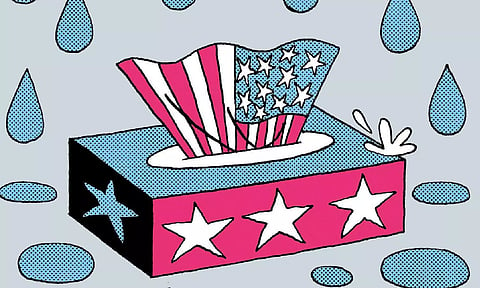

• PATTI DAVIS
The night before my father, Ronald Reagan, died, I listened to his breathing — ragged, thin. Nothing like that of the athletic man who rode horses, built fences at the ranch, constructed jumps from old phone poles, cut back shrubs along riding trails. Or of the man who lifted his voice to the overcast sky and said, “Mr. Gorbachev, tear down this wall.”
Time and history folded over themselves inside me, distant memories somersaulting with more recent realities — the 10 years of his journey into the murky world of Alzheimer’s and my determination to abandon the well-worn trail of childhood complaints and forge a new path. To be blunt, I had resolved to grow the hell up.
I can still remember how it felt to be his child, though, and how the attention he paid to America and its issues made me jealous.
Long before my father ran for office, politics sat between us at the dinner table. The conversations were predictable: Big government was the problem, the demon, the thing America had to be wary of. I hated those conversations. I wanted to talk about the boy who bullied me on the school bus, not government overreach.
In time I came to resent this country for claiming so much of him. Yet today, it’s his love for America that I miss most. His eyes often welled with tears when “America the Beautiful” was played, but it wasn’t just sentiment. He knew how fragile democracy is, how easily it can be destroyed. He used to tell me about how Germany slid into dictatorship, the biggest form of government of all.
I wish so deeply that I could ask him about the edge we are teetering on now, and how America might move out of its quagmire of anger, its explosions of hatred. How do we break the cycle of violence, both actual and verbal? How do we cross the muddy divides that separate us, overcome the partisan rancour that drives elected officials to heckle the president in his State of the Union address? When my father was shot, Tip O’Neill, then speaker of the House and always one of his most devoted political opponents, came into his hospital room and knelt down to pray with him, reciting the 23rd Psalm. Today a gesture like that seems impossible.
So what would my father say about the decline of civility and the ominous future of our democracy? I don’t think he would address his party’s front-runner at all. I think he would focus on the people who cheer at that candidate’s rallies. He would point out to them that dictatorships aren’t created by one person; they’re created by all the people who fall in line and say yes.
In 1967, after my father was sworn in as governor of California, we went to the governor’s mansion, a creaky old house on a busy street. I was 15, unhappy at being a governor’s daughter; I felt helpless and scared. So I sneaked away from everyone and climbed two flights of stairs to the building’s cupola, where I looked down from one of the windows at a crowd of people gathered on the sidewalk. They looked blessedly small from that distance. Suddenly one of them noticed me up there, and strangers started waving. I remember backing up quickly, sitting down on the dusty floor and crying my eyes out.
Thirty-seven years later, I watched another crowd of strangers pressed together along sidewalks and gathered on freeway overpasses as we drove by in the motorcade that carried my father’s coffin. This time I felt comforted by their presence. America and I have had a rocky relationship, but the way the country paused for those few days was a balm on the messiest parts of my grief.
This is how we end up whispering to people who are gone, wishing we could tell them that we’ve grown and learned and changed. My father believed in a realm beyond this earthly one, so maybe he hears my whispers. Maybe he sees the sad chaos in the country he loved so much. And maybe some of the tears I shed for America are his.